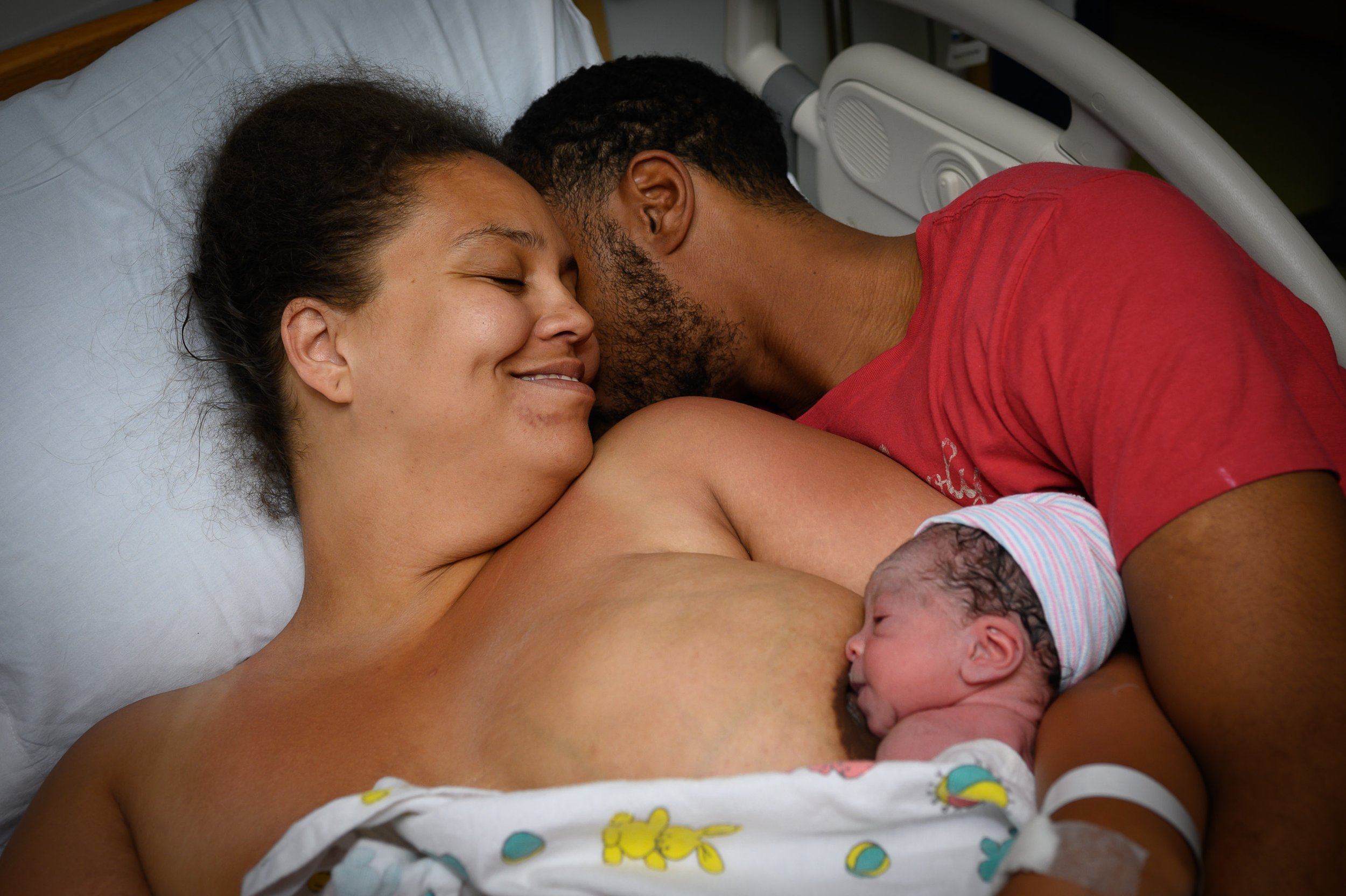The case for midwife-led postpartum and newborn care
I have always said: that the biggest reason to hire a home birth midwife is for postpartum care. While there are indeed many reasons to hire a midwife for your pregnancy and birth, the difference between midwifery-led postpartum care and mainstream hospital-based postpartum care is night and day. I’ll be blunt: the US healthcare system has full-on neglected postpartum people, and the health consequences can be dire. But beyond the critical health assessments provided in those early days and weeks of your child’s life, the postpartum is a time of massive transition and vulnerability, and having consistent and attuned care during that period is so important. It lays the groundwork for an easy and connected parenting journey.
Mainstream Postpartum and Newborn Care
Let’s first take a look at how new parents and babies are cared for in the mainstream US healthcare system, and how outcomes compare to other countries with more robust postpartum healthcare and support services. In the US, it is typical to be hospitalized for around 24-48 hours after a normal vaginal birth (and 72 hours after a cesarean birth). After discharge, there are no routine OB visits or postpartum care until six weeks after birth. That six-week OB visit is typically allotted 15 minutes of time, and includes a talk about contraceptive options, a pelvic exam, and a vital signs check. That’s it. That’s all you get.
Care for Mother Vs. Baby
Meanwhile, your baby is receiving pediatric care, which typically includes 1-2 appointments in the first week, and checkups at 2 weeks, 4 weeks, and 8 weeks. At those appointments, they will weigh your baby, take vitals, do labs if indicated, and give vaccines per the CDC schedule. Most pediatricians have very minimal knowledge about breastfeeding/chestfeeding, so if this is something you want support with, neither your OB nor pediatrician will be able to offer much help or guidance.
Postpartum Care in the US vs. Other Countries
Compared to other countries in the global North, the U.S. offers much less routine postpartum care, and morbidities and mortalities are reflected in this deficit. In 2018, there were 17 maternal deaths for every 100,000 live births in the U.S. — which is more than double that of most other high-income countries. By comparison, in 2018 the maternal mortality ratio was 3 per 100,000 or fewer in in the Netherlands, Norway, and New Zealand[1]. (Note: the term “maternal mortality” refers to a death occurring during pregnancy or in the first year after giving birth. In the U.S., approximately one-third of maternal mortalities occur in the postpartum.)
No Routine Home Visits
The U.S. is one of the few high-income countries that does not provide routine home visits for postpartum families. In most European countries, it is standard practice for a nurse or midwife to do at least one home visit in the first week postpartum, regardless of whether the birth took place at home or in the hospital.
World Health Organization Recommendations
The World Health Organization recommends at least four health appointments in the first six weeks after birth[2], yet the U.S. health system only typically provides one postpartum appointment at six weeks. In a 2016 volume of The Journal of Obstetric, Gynecologic & Neonatal Nursing, in an article entitled “Postpartum Preeclampsia,” the author reports: “Indeed, 10% of maternal deaths from hypertension occur during the postpartum period, possibly because this may be beyond the window of routine care for new mothers.[3]” Preeclampsia is almost always manageable with proper medical attention, but when new parents are not receiving routine screening, many cases of postpartum preeclampsia go undetected, which can be fatal. Something as simple as a blood pressure check in those first weeks after a baby could be life-saving.
Racial Disparities in the U.S. Maternal Healthcare system
The maternal mortality rate in the U.S. is highly dictated by race. For Black birthers, the mortality rate is 37.1 per 100,000 births, compared to white birthers who have a mortality rate of 14.7 per 100,000 births. While there is much more to be said about healthcare disparities and race, it is clear that systemic racism is a major player in the maternal mortality crisis.
Midwifery-Led Postpartum Care
Midwives place high importance on the “fourth trimester;” the first 3 months of your baby’s life. This care is essential for physical health assessment, but it also includes so much more than that. Midwifery care in the postpartum is all about setting you up for success with nursing or baby feeding, bonding with your baby and attuning to their needs, getting proper nutrition, getting enough sleep, and tapping into the community and social resources. Not to mention, new parents typically have a ton of questions emerging in those early days and weeks, and having a midwife on-call, day and night, who picks up your calls at any hour and responds to your text messages is an invaluable resource.
Routine Postpartum Care From Midwives
The typical schedule of visits for homebirth midwives providing postpartum care is 3 visits in the first week, and additional visits at two weeks, four weeks, and six weeks. In my practice, the first two weeks of care is all done at the family’s home, as traveling for appointments in the first couple weeks can be disruptive to healing and bonding.
Care is Viewed as Interdependent by Midwives
A foundational difference that separates midwifery care from mainstream care is that the postpartum parent and newborn are viewed as an interdependent unit. In the mainstream model, the healthcare for the parent is fully separated from that of the newborn: the adult goes to the OB the child goes to the pediatrician, and the two providers are not coordinating or collaborating with each other to create an integrated health plan. In the midwifery model, we see the needs and wellbeing of the parent and child as intrinsically connected, and provide care that is centered on supporting and nurturing the entire family system.
Each visit tends to the physical, emotional, practical, and spiritual needs of the family. Since care is happening in the home setting, midwives are better suited to assess access to material resources like nutrition and safe housing, to assess relational health and familial/community support, and to tap into community and social resources for support.
Communication and Support Are Key Components of Postpartum Care with a Midwife
Postpartum appointments are scheduled for an hour in length, and often we go past an hour because there is so much to talk about. Typically, when I arrive at a family’s home for a postpartum visit, we will make tea and settle into the bedroom or living room. The conversation flows freely, and the parent(s) check in about how they are doing, both physically and emotionally. We spend a good amount of time talking about baby feeding, and often I’ll observe a feed and give suggestions or pointers based on what I’m seeing.
We talk about the mood in the postpartum:
How is the transition going?
How is your vitality?
What are you feeling?
Is there any anxiety or depression present?
We discuss sleep (for the whole family):
How many hours are you getting at a time?
What’s the quality of your sleep like?
We discuss community and familial support:
Are you having visitors?
Does this feel supportive or overwhelming?
Do you have support people helping out with meals, shopping, and household chores?
How can we mobilize your existing support system to better meet your needs?
For all of these areas (and more), we talk about strategies to optimize your well-being in ways that are most relevant to your circumstances, resources, and values. Midwifery is all about individualizing care to the specific needs of the family, rather than assuming everyone’s needs are the same.
The Inclusion of Physical Assessments of the Postpartum Parent and Baby
And of course, every appointment also includes a physical assessment of the baby and postpartum parent. For the adult, this includes checking vital signs; checking on the healing status of any tears or sutures from the birth; drawing labs, as indicated; checking in about postpartum bleeding; making sure the uterus is involuting (shrinking down to its pre-pregnancy size/position); and assessing for signs of infection. For the newborn, this includes a weight check to make sure they are gaining appropriately; checking in about their pees and poops; taking their vitals (heart rate, respiration rate, and temperature); assessing for jaundice; assessing the umbilical cord stump; and performing the Newborn Screening Test.
If you are ready to connect with a Midwife in berkeley, CA, and create a lasting meaningful bond with your caregiver, reach out today.
Postpartum families need ongoing and easily accessible care, that is tailored to their specific needs and circumstances, and that unifies the adult and newborn as a highly interconnected unit. Currently, this sort of care is only available to families who birth at home with a midwife, or those who privately hire a midwife to care for them in the first six weeks postpartum. My hope for the future of maternal and infant healthcare in the U.S. is that all families, regardless of their birthing location or economic status, receive appropriate and consistent care that tends to their physical and emotional well-being in the first year. This sort of care will help save lives, and will also create a foundation of confidence and greater ease for new parents.
Begin your birthing journey.
Other Services Offered By Emunah Midwifery:
Resources for Continued Learning:
1. The Commonwealth Fund: “Maternal Mortality and Maternity Care in the United States Compared to 10 Other Developed Countries”
2. ACOG: “Optimizing Postpartum Care”
3. ACNM: “Support After Birth”
4. Modern Midwife Blog: “Focusing on Postpartum”
5. National Institute for Health and Care Excellence: “Postnatal Care”
6. BMC Pregnancy and Childbirth “Mothers’ and fathers’ sense of security in the context of pregnancy, childbirth and the postnatal period: an integrative literature review”
7. Empirical Studies: “Support during the postnatal period: Evaluating new mothers' and midwives' experiences of a new, coordinated postnatal care model in a midwifery clinic in Sweden”





